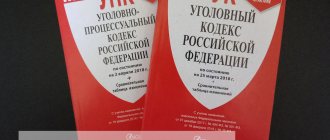1. Causing grievous bodily harm through negligence -
shall be punishable by a fine in the amount of up to eighty thousand rubles, or in the amount of the wages or other income of the convicted person for a period of up to six months, or by compulsory labor for a term of up to four hundred eighty hours, or by corrective labor for a term of up to two years, or by restriction of liberty for a term of up to three years. , or arrest for up to six months.
2. The same act, committed as a result of improper performance by a person of his professional duties, -
is punishable by restriction of freedom for a term of up to four years, or forced labor for a term of up to one year with deprivation of the right to occupy certain positions or engage in certain activities for a term of up to three years or without it, or imprisonment for a term of up to one year with deprivation of the right to occupy certain positions or engage in certain activities for a period of up to three years or without it.
3. Lost power.
4. Lost power.
Commentary to Art. 118 of the Criminal Code of the Russian Federation
1. When committing this crime, guilt can be expressed both in the form of frivolity and in the form of negligence. Causing moderate or minor harm to health through negligence does not entail criminal liability.
2. Part 2 of the commented article refers to the commission of this crime as a result of improper performance by a person of his professional duties. The increase in responsibility in these cases is due to the fact that the person performing professional duties must comply, along with general and special safety rules, due to professional activities. This article does not apply if the infliction of serious or moderate harm to health in the performance of professional duties is provided for by special norms (for example, Articles 216, 219, 263, 264, 266, 269 of the Criminal Code of the Russian Federation).
3. This crime should be distinguished from intentional infliction of harm to health. The distinction is made based on the factual circumstances of the case and the signs of guilt. The crime provided for in the commented article is characterized by the absence of both direct and indirect intent to intentionally cause grievous harm to the health of the victim. As a rule, the act is qualified under Art. 118 of the Criminal Code in the case when the consequences occur not as a result of direct impact on the victim, but due to the further development of the cause-and-effect relationship. For example, receiving serious injuries when falling from a push with your hands.
4. On the other hand, causing serious harm to health through negligence must be distinguished from innocent causing harm to health, i.e. case (incident). Innocent infliction of grievous bodily harm occurs if the person did not foresee the possibility of such harm and, due to the circumstances of the case, should not or could not have foreseen it, and also if the person, although he foresaw the possibility of its occurrence, could not prevent it due to the inadequacy of his psychophysiological qualities to the requirements of extreme conditions or neuropsychic overload (Article 28 of the Criminal Code of the Russian Federation).
5. Careless infliction of grievous bodily harm, resulting through negligence in the death of the victim, is qualified as causing death by negligence (Article 109 of the Criminal Code of the Russian Federation). If there is no careless guilt in relation to death, the act is qualified under Part 1 or 2 of Art. 118 of the Criminal Code of the Russian Federation, despite the fatal outcome.
Article 118. Causing grievous bodily harm through negligence
Resolution of the Supreme Court of the Russian Federation dated August 24, 2017 N 81-UD17-8, convicted under Part 1 of Art. 118 of the Criminal Code of the Russian Federation to 1 year 6 months of restriction of freedom, with the establishment on the basis of Art. of the Criminal Code of the Russian Federation restrictions and the imposition of duties listed in the verdict. The sentence was not reviewed on appeal.
Determination of the Judicial Collegium for Criminal Cases of the Supreme Court of the Russian Federation dated November 20, 2018 N 72-UD18-14
Part 1 Art. 118 of the Criminal Code of the Russian Federation to 1 year 6 months of correctional labor, part 1 of Art. 222 of the Criminal Code of the Russian Federation to 4 years in prison, on the basis of Part 2 of Art. The Criminal Code of the Russian Federation for the totality of crimes by partial addition of punishments finally imposed 5 years and 6 months of imprisonment to be served in a penal colony.
Appeal ruling of the Judicial Collegium for Criminal Cases of the Supreme Court of the Russian Federation dated July 16, 2019 N 88-APU19-5sp
In the appeal, lawyer Grishanova E.I. asks to change the sentence due to incorrect application of the criminal law, violation of the criminal procedural law and excessive severity. According to the lawyer, taking into account the circumstances established by the jury’s verdict, the actions of Ivankova T.F. should be qualified under Part 1 of Art. 109 of the Criminal Code of the Russian Federation, Part 1, Art. 118 of the Criminal Code of the Russian Federation. At the same time, the lawyer draws attention to the fact that the court, in support of the conclusion about the qualification of Ivankova’s actions and intent to kill, refers to circumstances not established by the jury’s verdict, namely the use of flammable material - gasoline, a small area of the room, enclosed space, and the absence of other exits from the trailer. Also, according to the defense lawyer, the conclusion that I. could not help but feel pain is based on assumptions.
Appeal ruling of the Judicial Collegium for Criminal Cases of the Supreme Court of the Russian Federation dated August 28, 2019 N 66-APU19-15
Lawyer Ismailov A.Yu. in the interests of the convicted Novozhilov A.N. indicates that the verdict against the defendant is based on assumptions and is not supported by reliable evidence. Novozhilov’s participation in the criminal community has not been proven, and the fact of his everyday communication with Zakharov and Kashnikov was erroneously assessed by the court as a crime. The trial in the case was conducted one-sidedly, with an accusatory bias, and the arguments of the defendants in their defense were not actually verified by the court or were simply ignored. The testimony of the victim G. is extremely contradictory, and, on the contrary, Novozhilov’s testimony throughout the entire preliminary investigation and at the trial was always stable, consistent and consistent with the case materials. In addition, during the preliminary investigation G. did not mention Novozhilov’s last name, but spoke about R., and in court he stated that a man named “R.” and "A." allegedly is the same person, although from his testimony at the court hearing it is clear that these are different persons, and they came to him at different times and in different compositions. The identification of Novozhilov carried out at the court hearing does not meet the requirements of Art. Art. 193, 289 Code of Criminal Procedure of the Russian Federation. Moreover, during the preliminary investigation of G., photographs of persons suspected of a crime were presented for identification, and this evidence was recognized as inadmissible evidence, and the law does not provide for the possibility of repeated identification of the same person. There is also no evidence in the case that Novozhilov acted as part of an organized group, and the victim G. did not confirm this conclusion of the court. Regarding the episode of causing grievous harm to V.’s health, the court did not take into due account Novozhilov’s testimony that it was he who was attacked by P. and, brushing him off, he could inadvertently hit V. on the head with a stick, who at that time was in a state of alcohol intoxication. He asks Novozhilov under paragraph “a” of Part 3 of Art. 163 and part 2 of Art. 210 of the Criminal Code of the Russian Federation to justify and re-qualify Novozhilov’s actions in the episode in relation to V. under Part 1 of Art. 118 of the Criminal Code of the Russian Federation.
Appeal ruling of the Judicial Collegium for Criminal Cases of the Supreme Court of the Russian Federation dated 09/03/2019 N 56-APU19-15SP
Art. 118 part 1 of the Criminal Code of the Russian Federation for a period of 1 year 10 months, on the basis of Art. Part 2 of the Criminal Code of the Russian Federation by partial addition of punishments - for a period of 2 years 10 months with the imposition of the obligation to appear at a specialized state body supervising the serving of sentences in the form of restriction of freedom, 4 times a month for registration and with the establishment of restrictions: to stay at home at night time of day from 22 to 6 o'clock, without the consent of a specialized government body, do not change your place of residence or stay, do not travel outside the municipality of the Bolshoi Kamen urban district of Primorsky Krai.
Determination of the Judicial Collegium for Civil Cases of the Supreme Court of the Russian Federation dated September 23, 2019 N 45-КГ19-8
In relation to Isakov V.A. a criminal case was initiated on the grounds of a crime provided for in Part 1 of Article 118 of the Criminal Code of the Russian Federation (infliction of grievous bodily harm by negligence), which was subsequently terminated due to the reconciliation of the parties (Article 25 of the Criminal Procedure Code of the Russian Federation).
Resolution of the Supreme Court of the Russian Federation dated October 31, 2019 N 18-UD19-100
By the resolution of the Presidium of the Krasnodar Regional Court dated June 19, 2021, the verdict of the Abinsky District Court of the Krasnodar Territory dated July 5, 2021 and the appeal ruling of the judicial panel for criminal cases of the Krasnodar Regional Court dated August 30, 2021 in relation to Lagoda P.I. changed. It was decided to terminate the criminal case against P.I. Lagoda. according to Part 1 of Art. 118 of the Criminal Code of the Russian Federation on the basis of clause 3, part 1, art. 24 of the Code of Criminal Procedure of the Russian Federation, due to the expiration of the statute of limitations; reclassify the actions of Lagoda P.I. from clause “c”, part 4, art. 162 of the Criminal Code of the Russian Federation at paragraphs “a”, “g”, part 2 of Art. 161 of the Criminal Code of the Russian Federation (as amended by the Federal Law of the Russian Federation of December 8, 2003), according to which a sentence of 4 years and 8 months of imprisonment to be served in a general regime correctional colony is imposed.
Cassation ruling of the Judicial Collegium for Criminal Cases of the Supreme Court of the Russian Federation dated November 28, 2019 N 18-UD19-100
By a resolution of the Presidium of the Krasnodar Regional Court dated June 19, 2021, the verdict of the Abinsky District Court of the Krasnodar Territory dated July 5, 2021 and the appeal ruling of the judicial panel for criminal cases of the Krasnodar Regional Court dated August 30, 2021 were changed. It was decided to terminate the criminal case against P.I. Lagoda. according to Part 1 of Art. 118 of the Criminal Code of the Russian Federation on the basis of clause 3, part 1, art. 24 of the Code of Criminal Procedure of the Russian Federation, due to the expiration of the statute of limitations; reclassify his actions from clause “c” of Part 4 of Art. 162 of the Criminal Code of the Russian Federation at paragraphs “a”, “g”, part 2 of Art. 161 of the Criminal Code of the Russian Federation (as amended by the Federal Law of the Russian Federation of December 8, 2003), according to which a sentence of 4 years and 8 months of imprisonment to be served in a general regime correctional colony is imposed.
Cassation ruling of the Judicial Collegium for Criminal Cases of the Supreme Court of the Russian Federation dated January 29, 2019 N 11-UD18-40
convicted under Part 1 of Art. 115 of the Criminal Code of the Russian Federation to 400 hours of compulsory work, under Part 1 of Art. 118 of the Criminal Code of the Russian Federation to restriction of freedom for a period of 2 years 1 month, in accordance with Part 2 of Art. of the Criminal Code of the Russian Federation to restrict freedom for a period of 2 years 1 month, with the establishment of the restrictions listed in the sentence.
Determination of the Constitutional Court of the Russian Federation dated June 27, 2017 N 1437-O
Implementing these powers, the legislator established, in part two of Article 118 of the Criminal Code of the Russian Federation, criminal liability for causing grievous harm to health through negligence, committed as a result of improper performance by a person of his professional duties. This provision does not contain any legal uncertainty in the aspect raised in the applicant’s complaint and, therefore, does not violate his constitutional rights.
Cassation ruling of the Judicial Collegium for Criminal Cases of the Supreme Court of the Russian Federation dated July 2, 2020 N 32-O20-1
Stashkov Alexander Dmitrievich, ..., previously convicted on November 19, 2007 under Part 1 of Art. 118 of the Criminal Code of the Russian Federation to 1 year 3 months of correctional labor with deduction of 15% of earnings monthly, the punishment was served in connection with the crediting of time served in custody in the case from June 16 to November 19, 2007,
Judicial practice: sentences and punishment under Art. 118 of the Criminal Code of the Russian Federation
- Decision of the Supreme Court: Determination N 203-APU17-21... THE SUPREME COURT OF THE RUSSIAN FEDERATION Case No. 203-APU17-21 APPEAL DECISION Moscow August 31, 2021 Judicial Collegium for Military Personnel of the Supreme...
- Decision of the Supreme Court: Resolution No. 310P13 dated... DECISION OF THE PRESIDIUM OF THE SUPREME COURT OF THE RUSSIAN FEDERATION Case No. 310-P13 Moscow January 23, 2014 Presidium of the Supreme Court of the Russian Federation...
- Resolution of the Plenum of the Supreme Court of the Russian Federation dated... PLENARY OF THE SUPREME COURT OF THE RUSSIAN FEDERATION DECISION dated December 27, 2002 N 29 ON JUDICIAL PRACTICE IN CASES OF THEFT,...
- Judicial Collegium for Criminal Cases, appeal:... THE SUPREME COURT OF THE RUSSIAN FEDERATION Case No. 72-APU 17-21 APPEAL DECISION Moscow October 04, 2021 Judicial Collegium for Criminal Cases...
- Ruling of the ECtHR dated 02/14/2017 EUROPEAN COURT OF HUMAN RIGHTS THIRD SECTION CASE “MASLOVA VS. RUSSIAN FEDERATION” (Complaint No. 15980/12) JUDGMENT…
- Resolution of the Presidium of the Supreme Court of the Russian Federation dated... PRESIDIUM OF THE SUPREME COURT OF THE RUSSIAN FEDERATION DECISION dated December 5, 2018 N 126-P18 ON RESUMING PROCEEDINGS IN THE CASE DUE TO NEW...
- Resolution of the Plenum of the Supreme Court of the Russian Federation dated... PLENARY OF THE SUPREME COURT OF THE RUSSIAN FEDERATION DECISION of November 15, 2021 N 48 ON THE PRACTICE OF APPLICATION BY COURTS OF LEGISLATION GOVERNING FEATURES...
- Resolution of the Plenum of the Supreme Court of the Russian Federation dated... PLENAUM OF THE SUPREME COURT OF THE RUSSIAN FEDERATION DECISION dated June 25, 2021 N 18 ON JUDICIAL PRACTICE IN CASES OF CRIMES,...
- Decision of the Supreme Court: Determination No. 38-АПУ17-2 dated... THE SUPREME COURT OF THE RUSSIAN FEDERATION No. 38-АПУ17-2 APPEAL DECISION Moscow March 1, 2021 Judicial Collegium for Criminal Cases of the Supreme Court...
- Resolution of the Plenum of the Supreme Court of the Russian Federation dated... PLENAUM OF THE SUPREME COURT OF THE RUSSIAN FEDERATION DECISION dated December 17, 2021 N 43 ON SOME ISSUES OF JUDICIAL PRACTICE IN CASES...
Punishment
Measures of influence on a criminal guilty of unintentionally causing grievous harm are given in paragraph 118 of the Criminal Code. They are listed in the table below.
| Type of punishment | Type of crime | |
| Ordinary | Skilled | |
| Fine (thousand rubles) | 80.0 or income for six months | — |
| Mandatory work (hours) | 480 | — |
| Correctional work (years) | 2 | — |
| Restriction of freedom (years) | 3 | 4 |
| Arrest (months) | 6 | — |
| Forced labor (years) | — | 1 |
| Deprivation of the right to engage in activities (years) | — | 3 |
| Deprivation of liberty | — | 1 |
Hint: the table shows the maximum penalties.
How to prove unintentionality of actions?
To prove the unintentionality of the crime committed by the culprit, he needs to prove that, while causing damage to the health of the victim (through blows, a strong push, etc.), he did not understand the seriousness of the consequences.
This may be indicated by the domestic nature of the act. For example, during an argument that escalated into a conflict, a man pushed his pregnant wife, as a result of which she lost her unborn child.
The perpetrator had no intention to terminate her pregnancy, but due to the conflict, he could not restrain his emotions, and as a result, he caused grievous harm through negligence.
An important role in the trial will be played by the testimony of witnesses who could confirm that the damage was caused to the victim spontaneously , that the criminal did not commit any pre-prepared actions. The absence of a crime plan also indicates that it was committed unintentionally.



